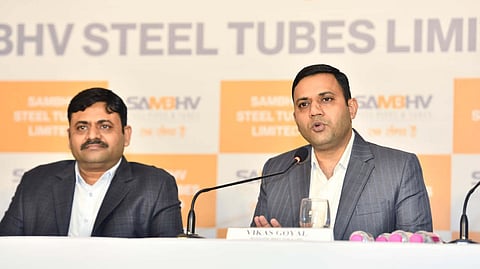Steel pipes find applications in several industries and sectors. According to a CRISIL report, various projects and schemes initiated by the Central government and several state governments have been driving the demand for steel pipes in India. Water supply, sanitation, irrigation and flood control have consistently been top end-use sectors for the steel pipe industry and are expected to continue to drive steel pipes’ demand over the next few years as well, through government-led schemes, such as Jal Jeevan Mission and Har Ghar Nal Yojana, among others.
The demand for domestic steel pipes and tubes is projected to increase to 18.50-20.50 million tonnes per annum in 2028-29 at 8-9 per cent CAGR during 2024-25 to 2028-29, on a high base (CRISIL Report). The growth would primarily be led by structural infrastructure and irrigation sector, which would continue to account for 50-55 per cent of total domestic steel pipe demand.
The demand for steel pipes and tubes will also be getting the push from the potential substitution of conventional construction materials, such as concrete cement and conventional steel (CRISIL). For example, owing to tubular steel being 10-20 per cent lighter than conventional steel, the foot-over bridges and ceiling planned to be constructed under the government’s ‘Amrit Bharat Station Scheme’ would be made completely from steel pipes and tubes. The scheme, which plans to redevelop about 1,275 railway stations in the next five years, is expected to present a total sales opportunity of 500-3,000 tonnes of steel pipes and tubes per railway station.
Raipur-based Sambhv Steel Tubes Ltd (SST) is tapping these vast opportunities. It commenced operations in 2018 with the manufacturing of sponge iron. In its seven-year journey, it has continuously moved towards the manufacture of value-added products through its integrated set-up. Promoters Brijlal Goyal, Suresh Kumar Goyal (chairman & ED) and Vikas Kumar Goyal (MD & CEO), whose experience in steel making and manufacturing sectors touch 20 years on an average, have played a vital role in the growth of the business.
Manufacturing operations
SST has a single-location, backward-integrated facility in India. Its fully integrated manufacturing operations encompass production of intermediate products, such as sponge iron, mild steel blooms/ slabs, HR coils, GP coils and CR Coils, which are used primarily for captive consumption for manufacturing the company’s final products, namely ERW black pipes and tubes (hollow section), CRFH pipes, Corten steel pipes, GP pipes, GI pipes, steel door frames, etc. Recently, it has started making stainless steel products, such as blooms/slabs and HR coil, SS HRAP coils and CR Coils.
“Backward integration helps us in achieving operational efficiency, reducing product costs, controlling supply of raw materials and monitoring the quality of our products, thus giving us a competitive advantage,” says Suresh Goyal. “Our integrated set-up also reduces delivery timelines which allows us to service our customers faster, leads to higher operating margins and allows us to produce value-added products”.
SST intends to add an installed capacity of about 1.20 million tpa of finished product in three phases. Further, pursuant to a resolution passed by the Board on 9 June 2025, the company is planning to commission a green-field manufacturing facility in Kesda village, Baloda Bazar Bhatapara district, Chhattisgarh. This facility will be operated by its subsidiary, Sambhv Tubes Private Limited. SST is raising fresh funds of Rs440 crore to reduce borrowings and manage working capital. After the IPO sized at about Rs540 crore, SST will become net debt-free and have a market cap of over Rs2,400 crore.
SST intends to continue to expand its distribution network by leveraging its relationship with existing distributors, while simultaneously pursuing opportunities to develop new relationships in new geographies by expanding production capacities. As of 2024, SST’s products were sold through 37 distinct distributors. And a major portion of sales value in 2022-23 and 2023-24 came from northern and western India, respectively. SST also plans to expand its international footprint.
“We will continue to develop new value-added products and focus on customisation to increase our customer base and satisfy evolving market trends,” says Vikas Goyal. “Ongoing product development remains a core focus area for our company and we aim to continue this. We regularly work with our customers to develop customised products for them. We believe that this enables us to increase wallet share, while simultaneously helping us to diversify our product basket, offering customers with newer solutions”.
“Our initiatives, such as establishing a captive power plant to reduce dependency on external power sources and using by-products from our manufacturing processes, such as dolochar, to manage our costs underscore our focus on cost optimisation,” sums up Goyal.

